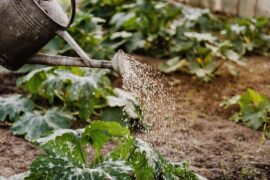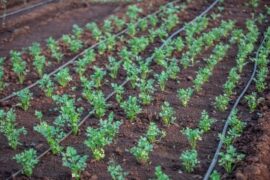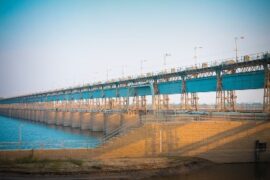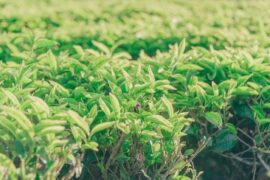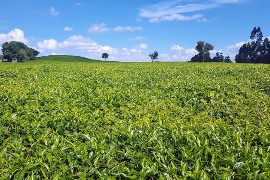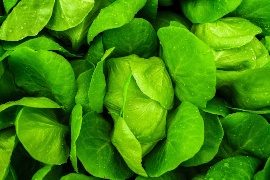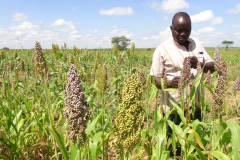Lisa Verschuren is a dedicated and experienced hydrology consultant with a strong background in water resource management, remote sensing and GIS. She holds an MSc. in Water Management from Delft University of Technology, where she did research projects in Nepal on the use of citizen science for land use validation and rainfall in the Kathmandu valley. She holds a BSc. in Systems Engineering, Policy and Management from the same institution.
In her current role, Lisa focuses on innovative projects like SOSIA+, a climate-smart irrigation service in Ghana and the RoSPro project, aimed at improving water security in Nepal through roadside protection. In these projects, Lisa is responsible for translating large and complex datasets and models into actionable advice. Prior to this, she worked as a consultant in urban water management at Royal Haskoning DHV.
In addition to her project work, Lisa is skilled in several simulation models, including HEC-HMS and SPHY, as well as programming languages like Python, R, and Javascript. She is proficient in GIS and remote sensing tools such as ArcGIS, QGIS, and Google Earth Engine.
Lisa’s work is characterized by a commitment to enhancing sustainable water management practices and supporting climate-resilient agriculture, particularly in vulnerable regions. Her interdisciplinary approach and international experience make her a valuable asset in addressing global water challenges.
Related projects
-
SOSIA+: Climate Smart Irrigation Services in Ghana
Earlier this year FutureWater finished a very first draft of the irrigation advisory application SOSIA, with promising results in Rwanda and Zambia. The SOSIA Irrigation Advisory Tool was based on satellite data only. For this project, the SOSIA+ tool will be developed. SOSIA+ will also include real-time local ground data...
-
MAGDA: Meteorological Assimilation from Galileo and Drones for Agriculture
The MAGDA project aims at providing an integrated – but modular – system to provide severe weather forecasts and irrigation advisories enhanced by means of various satellite-borne, drone-borne and ground-based weather-observing technologies. The main applications will be in providing both warnings about severe weather that could affect crops and irrigation...
-
Hydrological Assessment for the Lunyangwa Dam
The Lunyangwa Dam is prone to overtopping during the wet season. Raising the spillway crest and/or installing gates on the existing crest will allow an increase in the retention level. In order to determine the height of the redesigned spillway, a flood analysis was conducted for several return periods in...
-
SOSIA: Small-Scale Open Source Satellite-based Irrigation Advice
FutureWater currently furthers the development of the SOSIA tool: an irrigation advice for small-scale food producers. Due to the lack of local weather station data, virtual weather stations derived from open-source satellite data are established, and combined with crop stage, and projected and historical precipitation data. The SOSIA tool allows...
-
HiFarm: Data Driven Agricultural Intensification Pilot Program for Maize, Coffee and Tea Farmers in Kenya
The eco.business Fund, in partnership with FutureWater and Export Trading Group (ETG), one of the largest integrated agricultural supply chain managers and processors in sub-Saharan Africa, has launched a pilot project in Kenya for data-driven agricultural intensification. This project aims to improve farmer productivity and profitability whilst enhancing the environmental...
-
Mavo Diami: Services on Land-crop Suitability Mapping and Operational Irrigation Advice in Angola
The overall project goal is to improve sustainable food and income security for >100,000 smallholder farmers in Angola, by accelerating their agri-business performance through informed decisions supported by the Mavo Diami services built on weather, soil and crop signals and other relevant data and indicators. Ensuring the services are offered...
-
APSAN-Vale: Piloting Innovations to Increase Water Productivity and Food Security in Mozambique
The project has as its overall aim to increase climate resilient agricultural productivity and food security, with a specific objective to increase the water productivity and profitability of smallholder farmers in Mozambique, prioritizing small (family sector) farmers to increase food and nutritional security. This project will demonstrate what the best...
Related publications
-
2024 - Technical report
Demonstrator operational irrigation advisory service
Verschuren, L., A. Fernández, M. de Klerk, S. Contreras, E. Aparicio Medrano
-
2023 - Technical report
MAGDA: Water Balance Simulations
Verschuren, L., A. Fernández, M. de Klerk, S. Contreras, E. Aparicio Medrano
-
2023 - FutureWater Report 240
SOSIA: Small-Scale Open Source Satellite-based Irrigation Advice. Report Phase 2.
D'Haeyer, B., L. Verschuren, B. de Vries
-
2022 - FutureWater Report 239
APSAN-Vale Water Productivity Analysis: Irrigation Season 2022 (in Portuguese)
Verschuren, L.M., T. Schults, M. de Klerk
-
2022 - FutureWater Report 239
APSAN-Vale Water Productivity Analysis: Irrigation Season 2022
Verschuren, L.M., T. Schults, M. de Klerk
-
2022 - FutureWater Report 238
APSAN-Vale Water Productivity Analysis: Rainfed Season 2021-2022 (in Portuguese)
Verschuren, L.M., T. Schults, M. de Klerk, J.D. van Opstal
-
2022 - FutureWater Report 238
APSAN-Vale Water Productivity Analysis: Rainfed Season 2021-2022
Verschuren, L.M., T. Schults, M. de Klerk, J.D. van Opstal
-
2022 - Technical Report
Hydrological Study of the Lunyangwa Dam Catchment in Mzuzu, Malawi
Verschuren, L., J. Hunink
-
2022 - FutureWater Report 237
SOSIA: Small-Scale Open Source Satellite-based Irrigation Advice. Report Phase 1.
D'Haeyer, B., J. van Opstal, L. Verschuren, G.W.H. Simons, M. de Klerk, B. de Vries

